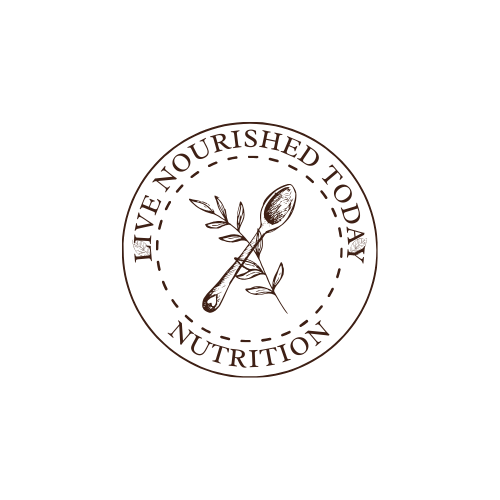Live Nourished Today, LLC
Nutrition For Menopause
What is Menopause?
Menopause is described as the point in time 12 months after a woman’s period. It is the end of your menstrual cycles. During this time, a woman’s body produces less hormones specifically less estrogen and progesterone. This typically happens during the ages of 45 and 55. Menopause can result from naturally declining reproductive hormones.
Signs and Symptoms of Menopause:
• Fatigue
• Absence of or irregular menstrual cycle
• Night sweats
• Hot flashes or sweating
• Osteoporosis
• Weight gain
• Slower metabolism
• Loss of scalp hair
• Insomnia
• Mood changes
Nutrition and Menopause
• Combine carbohydrates with protein:
In order to get adequate energy throughout the day while managing your mood, make sure your snacks and meals have one source of carbs and protein in them. Snacks such as fruits with nuts or fruit with cheese. Meals such as potatoes and chicken, fish with rice, or beans with veggies.
• Aim for 20-25 grams of protein per meal.
• Consume more complex carbohydrates:
Nutrient dense carbs like fruits, veggies, and whole grains, are a great option because our bodies can’t handle carbohydrates as well compared to before. Incorporate more oats, sweet potatoes, berries, veggies, and quinoa.
• Incorporate more healthy fats. Estrogen is cardioprotective, so when our estrogen decreases with menopause, we need to protect our heart health even more by adding healthy fats such as fish, nuts and seeds.
• Consume foods that promote bone health:
As we age, we don’t build our bones anymore, so it’s imperative to consume a diet that has enough calcium, vitamin K and vitamin D. Adding foods such as fish, chicken, yogurt, tofu, milk, dark leafy greens can increase your calcium and vitamin D levels.
• Increase your physical activity, specifically strength training:
Strength training and exercise can slow muscle loss and weight gain that you can experience with menopause and can increase your bone density.
• Decrease your caloric intake:
Since our metabolism slows down as we age. To maintain or decrease your weight, it is best to slightly reduce your caloric intake while incorporating physical activity.
Supplements that may help you:
Calcium.
When estrogen decreases, there becomes more calcium loss in the body. Calcium is necessary for bone health.
Vitamin D.
It assists in calcium absorption, bone health & brain function.
Vitamin B-12.
As we age, our ability to decrease B-12 decreases. B-12 is necessary for brain function and nerve health.



